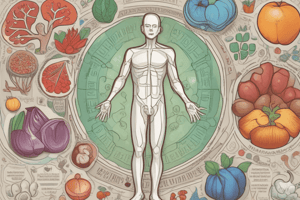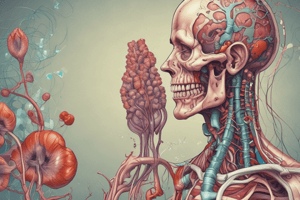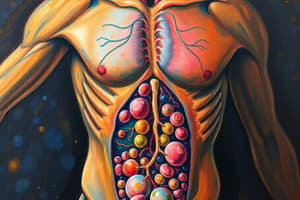Podcast
Questions and Answers
What is the primary function of carbohydrates in the body?
What is the primary function of carbohydrates in the body?
- To maintain healthy bones
- To build and repair body tissues
- To provide energy for the body (correct)
- To absorb vitamins
Which of the following is an example of a fat-soluble vitamin?
Which of the following is an example of a fat-soluble vitamin?
- Vitamin D (correct)
- Vitamin C
- Vitamin K
- Vitamin B
What is the main function of protein in the body?
What is the main function of protein in the body?
- To maintain healthy bones
- To provide energy for the body
- To build and repair body tissues (correct)
- To absorb vitamins
Which micronutrient is essential for brain function and hormone production?
Which micronutrient is essential for brain function and hormone production?
A diet rich in which of the following can help prevent cancer?
A diet rich in which of the following can help prevent cancer?
What is the main function of minerals in the body?
What is the main function of minerals in the body?
A balanced diet can help prevent which of the following diseases?
A balanced diet can help prevent which of the following diseases?
Which of the following is an example of a micro-mineral?
Which of the following is an example of a micro-mineral?
What is the main function of fiber in the body?
What is the main function of fiber in the body?
A diet rich in omega-3 fatty acids and antioxidants can help reduce the risk of which of the following?
A diet rich in omega-3 fatty acids and antioxidants can help reduce the risk of which of the following?
Flashcards are hidden until you start studying
Study Notes
Macronutrients
- Provide energy and support growth and maintenance of body tissues
- Three main categories:
- Carbohydrates:
- Primary source of energy for the body
- Found in grains, fruits, vegetables, and dairy products
- Include simple sugars, starches, and fiber
- Protein:
- Builds and repairs body tissues
- Found in animal products, legumes, nuts, and seeds
- Essential for muscle growth and maintenance
- Fat:
- Provides energy and helps absorb vitamins
- Found in animal products, oils, and fatty acids
- Essential for brain function and hormone production
- Carbohydrates:
Micronutrients
- Essential for maintaining optimal health and preventing disease
- Two main categories:
- Vitamins:
- Fat-soluble: A, D, E, and K
- Water-soluble: B and C
- Found in fruits, vegetables, whole grains, and dairy products
- Minerals:
- Macro-minerals: calcium, phosphorus, magnesium, potassium, sodium, and chloride
- Micro-minerals: iron, zinc, iodine, selenium, and copper
- Found in whole grains, fruits, vegetables, and dairy products
- Vitamins:
Nutrition and Disease Prevention
- A balanced diet can help prevent chronic diseases, such as:
- Heart disease: by reducing saturated fat, cholesterol, and sodium intake
- Diabetes: by managing carbohydrate and sugar intake
- Cancer: by consuming a diet rich in fruits, vegetables, and whole grains
- Osteoporosis: by maintaining adequate calcium and vitamin D intake
- A healthy diet can also help reduce the risk of:
- Malnutrition: by consuming a balanced diet that meets daily nutritional needs
- Digestive disorders: by maintaining a balanced gut microbiome
- Mental health disorders: by consuming a diet rich in omega-3 fatty acids and antioxidants
Macronutrients
- Provide energy and support growth and maintenance of body tissues
- Three main categories:
Carbohydrates
- Primary source of energy for the body
- Found in grains, fruits, vegetables, and dairy products
- Include simple sugars, starches, and fiber
Protein
- Builds and repairs body tissues
- Found in animal products, legumes, nuts, and seeds
- Essential for muscle growth and maintenance
Fat
- Provides energy and helps absorb vitamins
- Found in animal products, oils, and fatty acids
- Essential for brain function and hormone production
Micronutrients
- Essential for maintaining optimal health and preventing disease
Vitamins
- Fat-soluble: A, D, E, and K
- Water-soluble: B and C
- Found in fruits, vegetables, whole grains, and dairy products
Minerals
- Macro-minerals: calcium, phosphorus, magnesium, potassium, sodium, and chloride
- Micro-minerals: iron, zinc, iodine, selenium, and copper
- Found in whole grains, fruits, vegetables, and dairy products
Nutrition and Disease Prevention
- A balanced diet can help prevent chronic diseases, including:
Heart Disease
- Reduce saturated fat, cholesterol, and sodium intake
Diabetes
- Manage carbohydrate and sugar intake
Cancer
- Consume a diet rich in fruits, vegetables, and whole grains
Osteoporosis
- Maintain adequate calcium and vitamin D intake
- A healthy diet can also help reduce the risk of:
Malnutrition
- Consume a balanced diet that meets daily nutritional needs
Digestive Disorders
- Maintain a balanced gut microbiome
Mental Health Disorders
- Consume a diet rich in omega-3 fatty acids and antioxidants
Studying That Suits You
Use AI to generate personalized quizzes and flashcards to suit your learning preferences.



